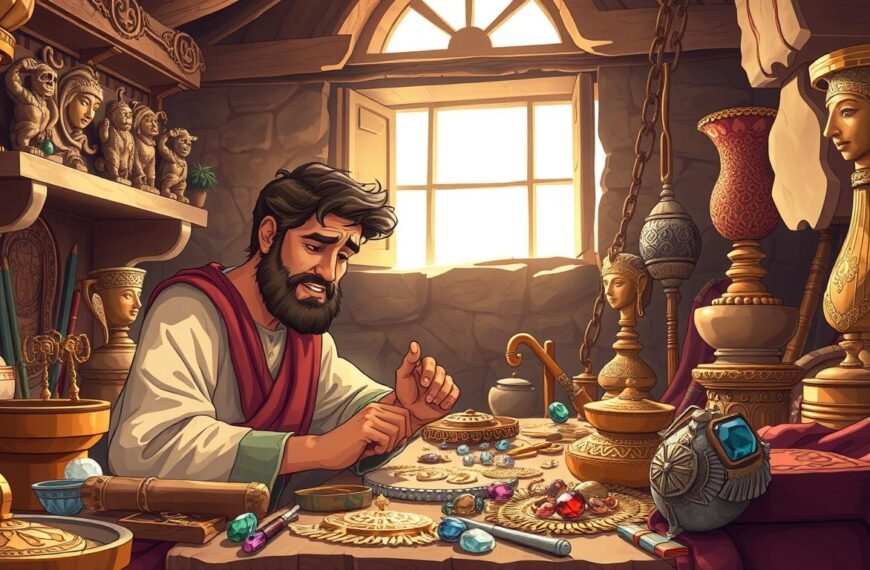Imagine if forgiving someone could change their whole life. Onesimus, a runaway slave, learned this from the apostle Paul. His story is in the Bible, especially in Philemon, where forgiveness and making amends are key.
At first, Onesimus was seen as worthless. But his journey shows us the power of grace and getting a second chance. His time with Paul in jail changed him and had big effects on early Christians. Onesimus’ story teaches us about forgiveness and being part of a community in Christian teachings.
Understanding Onesimus: The Enslaved Man
Onesimus was a key figure in early Christianity and slavery. He was a runaway slave who escaped from his master, Philemon. Onesimus faced many challenges, like many slaves in ancient Rome, where one-third of the people were slaves.
His name, “useful,” shows what was expected of slaves. They were meant to serve their masters well.
The letter to Philemon shows the complex situation of Onesimus. Paul asked Philemon to see Onesimus as a brother, not just a slave. This was unusual, as slaves could face harsh punishments, even death, for running away.
Yet, the letter talks about deep reconciliation and freedom. It shows how faith can change lives.
The New Testament teaches about unity among believers. Galatians 3:28 says in Christ, everyone is equal, no matter their status. While slavery wasn’t directly banned, there were teachings for both slaves and masters.
Slaves found comfort in their faith, knowing they were free in spirit. Masters were reminded of their duties. Onesimus’s story still inspires talks about faith and freedom.
The Background of Onesimus
Onesimus lived in the Roman Empire, where slavery was common. He was a slave in Colossae, owned by Philemon. Slaves had no rights and were seen as property.
Onesimus ran away, possibly after stealing, to start anew. He found Apostle Paul, who changed his life. This meeting was key to Onesimus’s future.
After meeting Paul, Onesimus became a key part of the early church. He even became the bishop of Ephesus. He helped gather Paul’s letters before A.D. 95, a big help to early Christianity.
When Onesimus returned, Philemon had to decide to forgive him. Forgiveness was hard in a society where money matters a lot. Onesimus’s story shows how redemption and acceptance can change lives.
Who Is Onesimus In The Bible?
Onesimus is a key figure in early Christianity. He was a slave of Philemon in Colosse. Onesimus ran away after stealing from his master.
He met the apostle Paul in Rome. This meeting changed his life and formed a deep bond.
Onesimus became a follower of Christ while with Paul. Paul called him a “faithful and beloved brother.”
This new faith led to a letter from Paul to Philemon. Paul asked Philemon to welcome Onesimus back as a brother.

Onesimus shows the power of redemption in the New Testament. His story teaches us about changing views on social relationships back then.
Some think Onesimus was more than a slave. He might have been a leader, even the Bishop of Byzantium from 54 to 68 AD.
His story shows how faith can change lives. It challenges old views on slavery and hierarchy.
For more on Onesimus, read the letter to Philemon. It shows his change and the values of forgiveness and brotherhood.
To learn more about similar figures, visit this resource.
The Encounter with Apostle Paul
Onesimus’s journey changed when he met Apostle Paul in a Roman prison. This meeting was a turning point for him. He was looking for help and guidance.
Many people wonder how they met. Some think Onesimus went to Paul for help. Others believe it was meant to happen by God.
Paul did more than just give advice to Onesimus. He became a mentor to him. Paul helped Onesimus find conversion and faith in Jesus Christ. This shows how important a good mentor can be.
Onesimus was seen as a guilty slave at first. He had run away from his master, Philemon. This made him stand out in a bad way.
His story shows how Paul’s help can change lives. Their bond shows us that even in hard times, we can find hope and purpose.
Transformation and Redemption of Onesimus
Onesimus changed from a runaway slave to a redeemed believer. He met the Apostle Paul while Paul was in jail. This meeting started a journey of redemption for Onesimus.
Onesimus became a Christian, showing the power of forgiveness and grace. Paul wrote a letter to Philemon, with just 25 verses. The letter talks about Onesimus’s change from a runaway slave to a valued friend.
Onesimus’s name means “useful” or “profitable.” It shows his big change. He became a positive influence, as Paul saw the good he could do in the faith community.
The story of Onesimus challenges old ways of seeing slaves. Paul was ready to pay for Onesimus’s return. This shows the power of love and forgiveness. Onesimus’s story gives us hope for change and a future filled with forgiveness.
The Letter to Philemon
The Letter to Philemon is a special message from the apostle Paul. It shows his strong belief in forgiveness and acceptance. Paul wants to make things right between Onesimus, a runaway slave, and Philemon, his master.
This letter is short, with only 335 words. But it gives us a peek into early Christian relationships.
Paul’s Plea for Forgiveness
Paul asks Philemon to forgive Onesimus. He says Onesimus has changed from a runaway slave to a dear brother in Christ. Paul wants Philemon to welcome Onesimus back.
This forgiveness is key to the Christian faith. It shows love and brotherhood among believers.
The Significance of Acceptance
Acceptance is a big part of the Letter to Philemon. Paul wants Philemon to see Onesimus as a faithful and beloved brother. This shows love and respect among believers.
By asking Philemon to accept Onesimus, Paul teaches us about reconciliation. This spirit of acceptance is important in the Christian community.
The Meaning of Onesimus’ Name
The name “Onesimus” means “useful” or “helpful.” This shows a big change in his story. At first, he was a runaway slave. But then, he met the Apostle Paul.
In Paul’s letter to Philemon, Onesimus is seen as more than a slave. He is now a beloved and faithful brother. This shows his new purpose in the Christian community.
This change shows the power of grace and redemption. Onesimus was once seen as worthless. But now, he is very valuable to Paul and Philemon. This shows how God’s grace can change lives.
His story teaches us about forgiveness and acceptance in Christianity. For more on the name meaning, check out this resource.
Onesimus’s story also teaches us about the potential in our faith. His change shows how redemption can change our purpose and identity. He is a key figure in teaching about grace and personal relationships.
Onesimus in the Context of Early Christianity
The story of Onesimus is set in early Christianity. This time had complex views on slavery. Paul’s letter to Philemon shows a new way of seeing relationships, thanks to Christian teachings.
This era was filled with ideas of spiritual equality. Galatians 3:28 says there is “neither slave nor free.” These ideas helped shape the early church’s views on slavery.
Slavery in Biblical Times
Understanding Onesimus means looking at slavery in biblical times. The New Testament doesn’t clearly say what happens to slaves. This makes texts like Philemon open to different interpretations.
Philemon is a short letter, which might make it less talked about. But, Paul’s request for Onesimus to be accepted shows the power of Christian friendship. It suggests a move away from old master-slave ways to seeing each other as equals in faith.
Onesimus’s story still sparks talks about dignity and equality today. It challenges early Christians to match their beliefs with the social orders they lived in. They were called to live with grace and community, ideas still important today in faith and social justice.
Church Traditions Surrounding Onesimus
Church tradition tells us a lot about Onesimus after he went back to Philemon. Many early church writers say Onesimus became the bishop of Ephesus. He shared the Gospel and helped the Christian community grow.
Onesimus changed from a runaway slave to a respected church leader. His story shows how faith can change lives. Martyrdom played a big part in his story. He faced harsh persecution and died for his faith.
Onesimus’ legacy is important in church traditions. It teaches us about forgiveness, reconciliation, and acceptance. The letter to Philemon shows how Onesimus’ journey is part of early Christian history. These traditions remind us of the values early believers held dear.
The story of Onesimus still inspires today. As February 15 comes, we remember Onesimus and Philemon’s contributions. They are honored for their roles in early Christian worship.

Onesimus’ Legacy and Impact on the Church
Onesimus’ story is a powerful example of change and redemption. He made a big impact on the early church. Paul called him a “son” in faith, showing the power of forgiveness and new beginnings.
His name means “useful” or “beneficial.” It shows how he changed, bringing people together. His story shows how the Gospel can fix broken relationships.
Church history says Onesimus might have become a bishop in Ephesus. This shows his big role in helping the early church. Paul’s letter to Philemon shows he hoped for forgiveness and peace.
This part of Onesimus’ story is very important today. It talks about grace, acceptance, and the value of every person. Onesimus went from being a runaway to a faithful follower. His story shows the power of grace in the Christian faith.
FAQ
Who was Onesimus in the Bible?
Onesimus was a runaway slave in the New Testament. He is mentioned in the book of Philemon. His life changed when he met the apostle Paul.
What do we know about Onesimus’s status as an enslaved man?
Onesimus was a slave of Philemon from Colossae. His exact status is debated. Some think he was an indentured servant, others a traditional slave.
How did Onesimus and Paul meet?
Onesimus met Paul while Paul was in prison in Rome. Some think it was planned. Others believe it was a divine meeting that changed Onesimus’s life.
What themes are present in the letter to Philemon?
Paul’s letter to Philemon talks about forgiveness and acceptance. He asks Philemon to see Onesimus as a brother in Christ. This shows love is more important than social norms.
What is the significance of the name "Onesimus"?
“Onesimus” means “useful” or “helpful.” Paul uses this name to show Onesimus’s change. He became truly useful in the ministry after his conversion.
How does Onesimus’s story relate to early Christianity?
Onesimus’s story shows the complex views on slavery in early Christianity. Paul’s appeal for reconciliation shows a move towards spiritual equality among believers.
What church traditions exist about Onesimus after his encounter with Paul?
Church traditions say Onesimus became the bishop of Ephesus. He was martyred for his faith. These stories highlight his importance in Christian history.
What legacy has Onesimus left on contemporary Christianity?
Onesimus’s story still influences today. It teaches about forgiveness, reconciliation, and the value of all believers. His story of grace and redemption is still important in Christian communities today.

Rockin’ the faith, one verse at a time!
Growing up, the Bible’s stories deeply impacted me. Now, with over 15 years of preaching experience, I blend timeless teachings with modern technology, making them relevant for today’s world.
Bible Hub Verse is my platform to share historical insights and thought-provoking articles, exploring both familiar and uncommon Christian topics. My passion is building a welcoming online space for everyone to learn, grow in their faith, and discover the Bible’s enduring message.
Join the journey!
God bless you.









